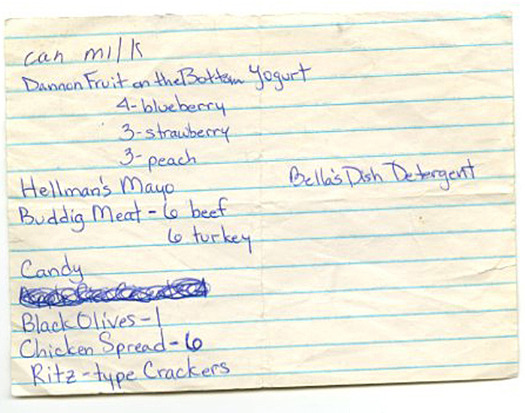
A found grocery list, via The Grocery List Collection.
Lists are the practical roadmaps by which we quantify our obligations. They're scorecards for accomplishment, spreadsheets for success. At once truncated and annotated, they urge us to consider hierarchy and value, want and need. Lists embrace both duty (what we’re meant to do) and aspiration (what we yearn to do), thereby perpetuating the enduring illusion that maybe we’re actually making progress.
As a genre unto themselves, the study of lists has inspired literary historians (Robert Belknap traced them as far back as Sumerian tablets in The List) and cultural scholars (Umberto Eco explored their epic significance in The Infinity of Lists), while lists both penned and illustrated by artists testify perhaps less to their practicality than to their indelible charm. (Liza Kirwin’s superb collection Lists: To-dos, Illustrated Inventories, Collected Thoughts, and Other Artists' Enumerations from the Collections of the Smithsonian Museum formed the basis for an exhibition at New York's Morgan Library in 2011.) In contemporary culture, we rely upon expert-driven lists to spare us the tedium of option paralysis: consider “Top Ten” gift lists, best-and-worst-dressed lists — and if you’re really keeping score — the perpetually-anticipated (and annually refreshed) Forbes list of richest Americans. Epistemologically speaking, there is no shortage of lists about lists: David Wallechensky and Amy Wallace’s Book of Lists is an exhaustive catalogue of list trivia (18 famous brains and what they weighed!) while Bill Keaggy’s Milk, Eggs, Vodka (and its online counterpart, grocerylists.org) is a captivating celebration of the asynchronous nature of list-making — and by conjecture, of the anonymous souls who made them.
Lists are, of course, the more casual variants of what we call inventories, and inventories themselves have a long and illustrious history — beginning, quite simply, with the Bible. (Are the Ten Commandments not a list?) The U.S. Constitution is a list, and so are manifestoes and dictionaries, course catalogues and telephone directories, invoices and menus, and for that matter, anything characterized by some kind of explicit taxonomy or classification scheme. Exams are lists, and so are ballots and recipes, wedding registries and tax returns, electric bills and driving directions and score sheets: they’re linear and logical, instruments of personal wayfinding and indexical reference.
But not all lists subscribe to such logic. Occasionally, lists provide a therapeutic benefit, as if the very act of writing something down can help keep chaos at bay. (The famously apprehensive Alfred Hitchcock once shared the order in which he had come to anticipate the surge of adrenaline preceding an anxiety attack: “1: small children, 2: policemen, 3: high places, 4: that my next movie will not be as good as the last one.”) If the internet itself can be considered a kind of list, then Google is the über-list, and indeed, once online, you can massage the formal qualities of the list-as-template to chronicle your own peripatetic priorities (see "Ta Da" List and "Teux Deux” List", for example). For that matter, there is Craigslist. (And not to be outdone, Angie's List!) Finally, for those of us determined to make our own mortality the defining feature of all essential decision-making, there is the recent phenomenon known as the "100 Things To Do/Eat/See/Before You Die" list: in common parlance, we call this a bucket list.
At the opposite end of the spectrum, there is the shopping list — a willy-nilly compendium that mirrors the unparalleled idiosyncrasies of its maker. Here, the order of items can be intentionally cryptic or just plain loopy. (If you’re lucky, it will be both.) Lists such as these typically sit rather far down on the information food chain: in the universe of list-making, they're doomed to an all-too-brief life expectancy. This is particularly true of the grocery list, a study in planned obsolescence if ever there was one, which is basically an aide-memoire rendered ineffectual once complete. Simply put: grocery lists are ephemera writ large, which is precisely what makes them so engaging. To look at a lovingly dog-eared shopping list is to ask yourself: what would possess a person to write nail-polish remover after construction boots? Squirt gun with hot peppers? Film alongside toilet bowl cleaner? Crackers before gas?
Each year in my seminar, I distribute a selection of shopping lists and ask each student to excavate the personal odyssey of the individual who might have made it. Such inquiry obliges them to mine their skills as amateur biographers, forensics experts and newly-minted visual thinkers. Was the scribe young or old? Single or married? Gay or straight, black or white, male or female — and why? Is it the handwriting? The paper choice? Do the items on the list give the person away? And what of the wretched penmanship, the poor spelling, the notepad with its goofy logo from some mysterious hotel or restaurant or dry cleaner? What are the visual cues, and how does our imagination play into reading and interpreting such seemingly random details? What is challenged, lost, or gained in constructing the imagined back story of a total stranger, and what does this say about our own back stories, and the biases we unwittingly invoke as we try to understand the stories of others? What role does empathy play in this exercise? Finally, how does the list function within the broader context of material culture as a whole, and how does it both serve — and comment upon — an imagined biographical narrative?
Priorities change, but our lists carry on: unwitting accomplices, they're palimpsests of the most pure, if primitive sort, recording our failed aspirations — our wishful (if not necessarily truthful) goals. For what is a list, after all, but a fleeting gesture of permanence in a world that never ceases to change? We make lists to stay afloat: part blueprint, part life raft, they contribute to a sense of who we are in the world, helping us navigate as we crawl inevitably forward. (“We like lists,” notes Eco, “because we don't want to die.”) Ephemeral though they appear to be, their persistence provides a tangible record of our own physical endurance. In their own bumbling way, lists bear witness. And so, it would seem, must we.


Comments [2]
05.08.13
03:24
05.16.13
01:58